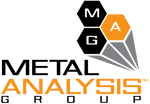EXPERT-APPROVED: LIBS ALLOY
Expert-Approved LIBS Analyzers for Machining from Metal Analysis Group
The advent of ultrashort pulsed lasers has revolutionized material processing, offering unparalleled precision and versatility in micro and nanomachining across various disciplines. However, the complexity of laser processing tasks, especially on composite samples, necessitates a keen understanding of the material interaction with the laser for optimal adjustment and endpointing. Real-time detection of materials during laser processing is crucial for streamlining operations and enhancing efficiency. While conventional methods like X-ray diffraction (XRD), X-ray photoelectron spectroscopy (XPS), and energy dispersive X-ray spectroscopy (EDS) offer valuable insights into material characterization, their reliance on interruptive processes poses significant challenges, hindering the seamless integration of material analysis with laser machining applications.
In response to these challenges, laser-induced breakdown spectroscopy (LIBS) emerges as a promising solution for in-situ material characterization. By analyzing the signal generated through laser-matter interaction, LIBS facilitates rapid and non-invasive material analysis, making it an ideal candidate for real-time detection and decision-making during laser machining processes. In this study, we propose a novel method leveraging LIBS within a feedback loop system to enable on-the-fly adjustment of laser processing parameters. Additionally, we demonstrate the potential of LIBS for automated material segmentation in 3D imaging scenarios resulting from consecutive laser delayering and imaging steps.
The utilization of ultrashort pulsed lasers for high-resolution material processing has opened up a myriad of micro and nanomachining applications across diverse fields. Complex laser processing tasks, particularly on composite samples, necessitate real-time detection of materials to fine-tune laser parameters and ensure precise endpointing. While conventional material characterization methods such as X-ray diffraction (XRD), X-ray photoelectron spectroscopy (XPS), and energy dispersive X-ray spectroscopy (EDS) offer valuable insights, their interruptive nature hampers seamless integration with laser machining processes. Laser-induced breakdown spectroscopy (LIBS) emerges as a powerful technique for in-situ material characterization, offering rapid analysis without disrupting machining operations. In this work, we propose a method leveraging LIBS within a feedback loop system to enable real-time detection and decision-making for on-the-fly adjustment of laser processing parameters. Additionally, we showcase the applicability of LIBS for automated material segmentation in 3D imaging scenarios, revolutionizing the automation of nanomaterial processing.
